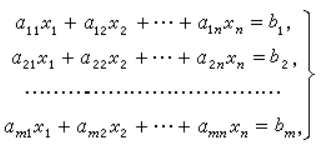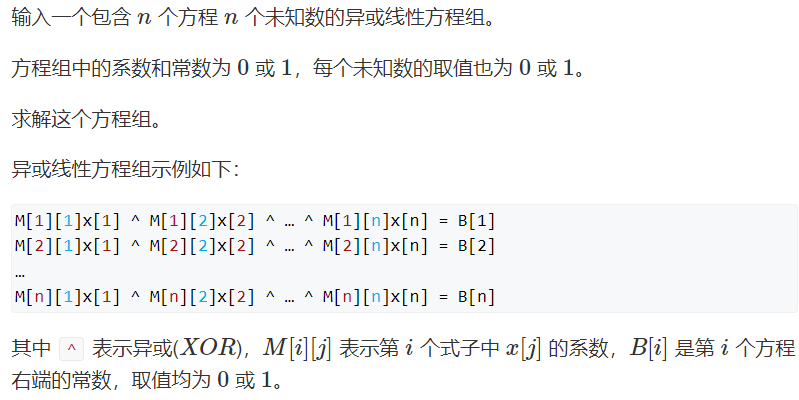解线性方程组
能在 n^3 时间复杂度求方程

模拟正常用行列式高斯消元的过程
- 第一列中选择绝对值最大的一行
- 放到第一行上
- 将该列系数化为1
- 循环123到最后一列
- 之后逆序求解
#include <iostream>
#include <cstring>
#include <algorithm>
#include <cmath>
using namespace std;
const int N = 1e2 + 10;
const double eps = 1e-6;
int n;
double a[N][N];
int gauss()
{
int c,r;
for(c = 0,r = 0; c < n; c++)
{
int t = r;
for(int i = r; i < n; i++)
if(fabs(a[i][c]) > fabs(a[t][c]))
t = i;
if(fabs(a[t][c]) < eps) continue;
for(int i = c; i < n+1; i++) swap(a[t][i], a[r][i]); // 交换到第一行
for(int i = n; i >= c; i--) a[r][i] /= a[r][c]; // 系数化为1
for(int i = r + 1; i < n; i++) // 把其他行的删去
if(fabs(a[i][c]) > eps)
for(int j = n; j >= c; j--)
a[i][j] -= a[r][j] * a[i][c];
r++;
}
if(r < n)
{
for(int i = r; i < n;i ++)
if(fabs(a[i][n]) > eps) return 2;
return 1;
}
for(int i = n - 2; i >= 0; i--)
for(int j = i + 1; j < n; j++)
{
a[i][n] -= a[j][n] * a[i][j];
}
return 0;
}
int main()
{
cin >> n;
for(int i = 0; i < n;i ++)
for(int j = 0; j < n + 1;j ++)
{
cin >> a[i][j];
}
int t = gauss();
if(t == 0)
{
for(int i = 0; i < n;i ++)
if(a[i][n] != 0)
printf("%.2lf\n", a[i][n]);
else
printf("0.00\n");
}
else if(t == 1) cout << "Infinite group solutions";
else cout << "No solution";
}异或线性方程组

类似于高斯消元, 把系数的算术变换改为异或运算, 实际上就是不进位的加法。
- 依然是寻找最大值, 不过这里找到一个1就行
- 交换到第一行
- 不需要去化系数, 本身就是1
- 将第一行式子与其他行式子相异或, 让该列为0
- 重复以上操作直到最后一个
- 然后逆向求解, 将一行中其他未知数的系数异或为0即可
#include <iostream>
#include <cstring>
#include <algorithm>
using namespace std;
const int N = 110;
int a[N][N];
int n;
int gauss()
{
int c,r;
for(c = 0, r = 0; c < n; c++)
{
int t = -1;
for(int i = r; i < n; i++)
if(a[i][c]){t = i; break;}
if(t == -1) continue;
for(int i = 0; i < n + 1; i++) swap(a[r][i], a[t][i]);
for(int i = r + 1; i < n; i++)
if(a[i][c])
for(int j = 0; j < n + 1; j++)
a[i][j] ^= a[r][j];
r++;
}
if(r < n)
{
for(int i = r; i < n; i++)
if(a[r][n]) return 2;
return 1;
}
for(int i = n - 1; i >= 0; i--)
for(int j = i + 1; j < n; j++)
if(a[i][j])
a[i][n] ^= a[j][n];
return 0;
}
int main()
{
cin >> n;
for(int i = 0; i < n; i++)
for(int j = 0; j < n + 1; j++)
cin >> a[i][j];
int t = gauss();
if(t == 0)
{
for(int i = 0; i < n;i ++) cout << a[i][n] << endl;
}
else if(t == 1) cout << "Multiple sets of solutions";
else cout << "No solution";
return 0;
}